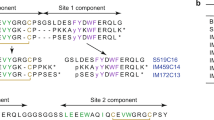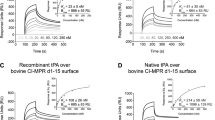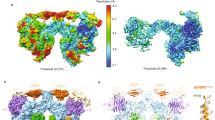Abstract
HARPEL and Mosesson1 observed that α2-macroglobulin-bound trypsin hydrolysed low molecular weight ester and amide substrates at rates comparable with those of free protease, but degradation of high molecular weight proteins was markedly inhibited. To account for this finding, Barrett and Starkey2 introduced the novel concept of steric entrapment of endopeptidases by α2-macroglobulin. Neurath and Walsh3 have recently reviewed the role of proteolytic enzymes in the conversion of a variety of enzymes, hormones, and other physiologically active proteins from inactive precursors to active forms by limited proteolysis. Many of these physiologically active proteins exist in the bloodstream in both precursor and active forms. We report here that proinsulin, a large polypeptide of 9,000 molecular weight, is rapidly hydrolysed by α2-macroglobulin-bound trypsin. This finding suggests that pro-teases bound to α2-macroglobulin may be involved in limited proteolytic cleavage associated with activation of precursor molecules as well as the degradation of biologically active polypeptides in the circulation.
This is a preview of subscription content, access via your institution
Access options
Subscribe to this journal
Receive 51 print issues and online access
$199.00 per year
only $3.90 per issue
Buy this article
- Purchase on Springer Link
- Instant access to full article PDF
Prices may be subject to local taxes which are calculated during checkout
Similar content being viewed by others
References
Harpel, P. C. & Mosesson, M. W. J. clin. Invest 52, 2175–2184 (1973).
Barret, A. J. & Starkey, P. M. Biochem. J. 133, 709–724 (1973).
Neurath, H. & Walsh, K. A. Proc. natn. Acad. Sci. U.S.A. 73, 3825–3832 (1976).
Chance, R. E., Ellis, R. M. & Bromer, W. W. Science 161, 165–167 (1968).
Chance, R. E. Diabetes: Proc. Seventh Cong. Int. Diabetes Fed., Buenos Aires, 1970 (eds Rodriguez, R. R. & Vallance-Owen, J.) 292–305 (Excerpta Medica, Amsterdam, 1971).
Steiner, D. F., Hallund, O., Rubenstein, A., Cho, S. & Bayliss, C. Diabetes 17, 725–736 (1968).
Yip, C. C. Proc. natn. Acad. Sci. U.S.A. 68, 1312–1315 (1971).
Rinderknecht, H. & Geokas, M. C. Biochim. biophys. Acta 295, 233–244 (1973).
Geokas, M. C., Brodrick, J. W., Johnson, J. H. & Largman, C. J. biol. Chem. 252, 61–67 (1977).
Rinderknecht, H., Silverman, O., Geokas, M. C. & Haverback, B. J. Clin. chim. Acta 28, 239–246 (1970).
Davis, B., Ann. N. Y. Acad. Sci. 121, 404–427 (1964).
Author information
Authors and Affiliations
Rights and permissions
About this article
Cite this article
LARGMAN, C., JOHNSON, J., BRODRICK, J. et al. Proinsulin conversion to desalanyl insulin by α2-macroglobin-bound trypsin. Nature 269, 168–170 (1977). https://doi.org/10.1038/269168a0
Received:
Accepted:
Published:
Issue Date:
DOI: https://doi.org/10.1038/269168a0
This article is cited by
-
Impaired mononuclear phagocyte function in patients with severe acute pancreatitis: Evidence from studies of plasma clearance of trypsin and monocyte phagocytosis
Digestive Diseases and Sciences (1993)
-
Correlation of trypsin-plasma inhibitor complexes with mortality in experimental pancreatitis in rats
Digestive Diseases and Sciences (1986)
-
Acute necrotising pancreatitis—a role for enterokinase
International journal of pancreatology (1986)
Comments
By submitting a comment you agree to abide by our Terms and Community Guidelines. If you find something abusive or that does not comply with our terms or guidelines please flag it as inappropriate.



